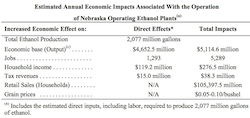In an update to a story posted last week regarding the new CBO report, “Renewable Fuel Standard: Issues for 2014 and Beyond,” more renewable energy industry representatives are speaking out regarding what they say are flaws in the report.
Tom Buis, CEO of Growth Energy said of the report, “This report looks at unrealistic scenarios and completely ignores the very goals of the Renewable Fuel Standard (RFS), which are to decrease our nation’s dangerous dependence on foreign oil, create jobs and spur economic growth and investment, and improve our environment, all while offering consumers a choice and savings at the pump. The CBO report simply shrugs off these critical policy goals contained in the RFS by noting that, ‘CBO did not account for that effect in this analysis.’
 Buis also pointed out the ethanol is currently trading a dollar less than gasoline on the Chicago Board of Trade, which the CBO fails to acknowledge. The report also fails to consider, said Buis, the 40 year history of volatile gas prices and also ignores the effect the current turmoil in Iraq. However, Buis points out, increased domestic fuel production of fuels such as ethanol and a decrease on dependence of foreign oil would help provide stability and reduce the price hikes in gas prices at the pump.
Buis also pointed out the ethanol is currently trading a dollar less than gasoline on the Chicago Board of Trade, which the CBO fails to acknowledge. The report also fails to consider, said Buis, the 40 year history of volatile gas prices and also ignores the effect the current turmoil in Iraq. However, Buis points out, increased domestic fuel production of fuels such as ethanol and a decrease on dependence of foreign oil would help provide stability and reduce the price hikes in gas prices at the pump.
“Clearly, this report is agenda driven and ignores the facts. Wild and statically unrealistic conclusions such as these show just how flawed the majority of this report is, and why it should not be taken with any level of seriousness,” added Buis. “It seems to me that the CBO got only one thing right in this assessment, and that is with regards to the production of ethanol from corn and how it has virtually no impact on the price of food. Yet, again it is flawed as it fails to highlight that the true driver of food costs is the price of oil.
The National Farmers Union (NFU) was also unhappy with the report and said that CBO’s claim that repealing the RFS would reduce gasoline prices is “simply false”. “The RFS has reduced consumer demand for oil, and the study fails to take that into account. It is unfortunate that CBO, which is supposed to be objective, released such a flawed study that does not take into account the reality of fuel markets,” said NFU Senior Vice President of Programs Chandler Goule.
“Study after study show that the RFS is saving consumers money. E85prices.com recently released data showing that consumers filling up with E85 can save an average of $0.61 less per gallon,” Goule continued. “The RFS is a successful policy tool that decreases our nation’s reliance on foreign oil, creates economic opportunities in rural America, and effectively decreases the greenhouse gas footprint of the transportation sector. CBO should have taken all of these benefits to consumers into consideration when performing the study.”
 Let’s put those interns to work. That’s what Illinois Corn is doing. Interns Tim Marten, a student at SIU-Edwardsville, and Elizabeth O’Reilly, a student at ISU, have been tasked with creating short videos that promote corn. The internships are funded by two communications scholarships from the Illinois Corn Marketing Board. Here’s an example of one of them below. You can find others here.
Let’s put those interns to work. That’s what Illinois Corn is doing. Interns Tim Marten, a student at SIU-Edwardsville, and Elizabeth O’Reilly, a student at ISU, have been tasked with creating short videos that promote corn. The internships are funded by two communications scholarships from the Illinois Corn Marketing Board. Here’s an example of one of them below. You can find others here.











